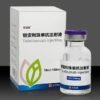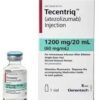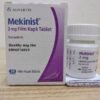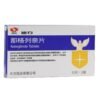March 29, 2023 (Lowe, NJ) Merck & Co., known as Merck & Co. (MSD) outside the United States and Canada, today announced that the U.S. Food and Drug Administration (FDA) has given full approval to Merck’s anti-PD- 1 Therapy KEYTRUDA is indicated for the treatment of adult and pediatric patients with unresectable or metastatic microsatellite instability-high (MSI-H) or mismatch repair deficient (dMMR) solid tumors, as determined by an FDA-approved test. Progression after prior therapy and no satisfactory alternative treatment options.
The move from accelerated approval to full (regular) approval was based on results from the Phase 2 KEYNOTE-158, KEYNOTE-164 and KEYNOTE-051 trials, including data from 504 adult and pediatric patients in more than 30 cancers. This marks the first time an immunotherapy based on a predictive biomarker has been fully approved.
Full approval was based on data from three multicenter, non-randomized, open-label, multi-cohort trials. KEYNOTE-164 (NCT02460198) enrolled 124 patients with advanced MSI-H/dMMR colorectal cancer who progressed on fluoropyrimidine and oxaliplatin or irinotecan, with or without anti-VEGF/EGFR mAb-based therapy treat. KEYNOTE-158 (NCT02628067) enrolled 373 patients with advanced MSI-H/dMMR non-colorectal cancer who had disease progression after prior therapy. Patients were either prospectively enrolled with MSI-H/dMMR tumors (cohort K) or retrospectively identified in one of 10 solid tumor cohorts (cohort AJ). KEYNOTE-051 (NCT02332668) enrolled seven pediatric patients with MSI-H/dMMR cancer. All trials excluded patients with autoimmune diseases or medical conditions requiring immunosuppression. Regardless of histology, MSI or MMR tumor status was determined using polymerase chain reaction (local or central) or immunohistochemistry (local or central), respectively.
Adult patients received KEYTRUDA 200 mg intravenously every three weeks (pediatric patients received 2 mg/kg every three weeks) until unacceptable toxicity, disease progression, or up to 24 months. In KEYNOTE-164 and KEYNOTE-158, tumor status was assessed every 9 weeks for the first year and every 12 weeks thereafter. In KEYNOTE-051, tumor status assessments were performed every eight weeks for 24 weeks and every 12 weeks thereafter. The primary efficacy outcome measures were objective response rate (ORR) and duration of response (DOR), as assessed by blinded independent central review according to RECIST v1.1 (modified to follow a maximum of 10 target lesions and a maximum of 5 target lesions) KEYNOTE- 158 organs) and were evaluated by investigators according to RECIST v1.1 in KEYNOTE-051.
In a pooled analysis of the three trials, KEYTRUDA had an ORR of 33.3% (95% CI, 29.2-37.6), including a complete response rate of 10.3% and a partial response rate of 23.0%, with a median follow-up of 20.1 months (range , 0.1 to 71.4 months). Among patients who responded (n=168), 77% had responses lasting 12 months or longer and 39% had responses lasting 36 months or longer. Median DOR was 63.2 months (range, 1.9+ to 63.9+ months).
In patients with MSI-H/dMMR colorectal cancer (n=124), KEYTRUDA had an ORR of 34% (95% CI, 26%-43%) and a DOR ranging from 4.4 to 58.5+ months. In patients with other MSI-H/dMMR non-colorectal solid tumors (n=380), including endometrial cancer, gastric or gastroesophageal junction cancer, small bowel cancer, brain cancer, ovarian cancer, biliary tract cancer, pancreatic cancer Carcinoma, sarcoma, breast cancer, cervical cancer, neuroendocrine cancer, prostate cancer, adrenocortical cancer, mesothelioma, thyroid cancer, small cell lung cancer, bladder cancer, salivary gland cancer, renal cell carcinoma and other cancers (including anal, Head and neck squamous cell carcinoma, nasopharyngeal carcinoma), retroperitoneal cancer, testicular cancer, vaginal cancer, vulvar cancer, appendiceal adenocarcinoma, hepatocellular carcinoma,
In KEYNOTE-158 and KEYNOTE-164, the median duration of exposure to KEYTRUDA was 6.2 months (range, 1 day to 53.5 months). In KEYNOTE-051, the median duration of exposure was 2.1 months (range: 1 day to 25 months).
Keytruda (pembrolizumab) is an anti-programmed death receptor-1 (PD-1) therapy that works by improving the body’s immune system’s ability to help detect and fight tumor cells. KEYTRUDA is a humanized monoclonal antibody that blocks the interaction between PD-1 and its ligands PD-L1 and PD-L2, thereby activating T lymphocytes that may affect both tumor cells and healthy cells.















Leave a reply